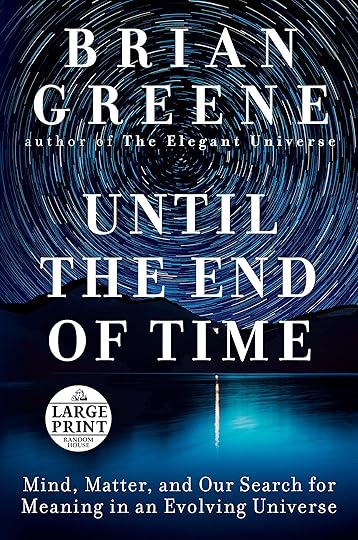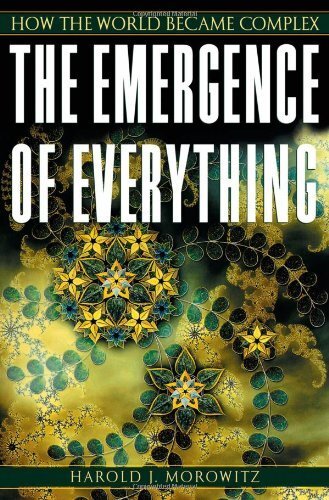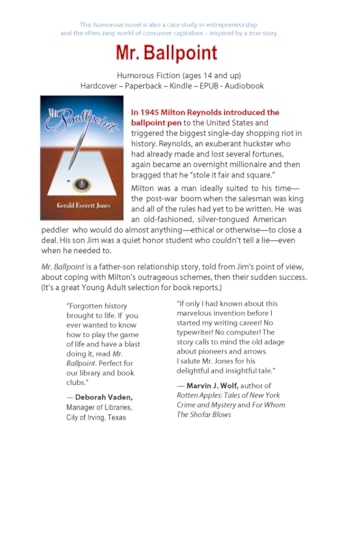Gerald Everett Jones's Blog: Gerald Everett Jones - Author, page 34
September 25, 2022
Thinking About Thinking: A Novel of Tomorrow’s Happy World

The Big Ball of Wax: A Novel of Tomorrow’s Happy World by Shepherd Mead. Here’s the cover of the Ballantine Books mass-market paperback I read back in the day. It’s now available on Kindle.
That’s the subtitle of Shepherd Mead‘s 1954 novel, The Big Ball of Wax.
Do you wonder – perhaps with trepidation and creeping anxiety – what the socioeconomic impacts of Virtual Reality (VR) might be?
Well, author Mead did that with painful humor back in 1954, before the maestro of Meta was even an embryo. Now that some are betting the high-tech farm on VR, perhaps we’d do well to take another look at this crusty tale.
It describes an invention that is See-Hear-Taste-Smell-Touch-o-Vision. Spoiler alert: Formerly thoughtful people check into cheap hotel rooms with no change of clothes and a bushel bag of uncooked rice, never to be heard from again.
Rehearsing brain surgery by VR seems like a sensible idea. But – wondering where your friends (or your kids) are because they’ve disappeared into an illusory fifth dimension?
Mead was also the author of another more popular cautionary tale – How to Succeed in Business Without Really Trying. I suspect some tech tyros are also unknowingly following that example, as well.
The post Thinking About Thinking: A Novel of Tomorrow’s Happy World appeared first on Gerald Everett Jones - Author.
August 7, 2022
Book Review – Platform – Where are you going on vacation?
I have a lot of respect for Michel Houellebecq as one of today’s foremost practitioners of literary fiction. I’d put Paul Auster in that category, as well. I’ve reviewed other novels by both of them in this blog. Another reason to read Platform was that its premise seemed comparable to my Harry Harambee’s Kenyan Sundowner – that is, an older, single, middle-class white man sets off on a vacation to an exotic resort where he expects he will find hookups and parties.

Houellebecq’s novel in French and English editions
There the similarity mostly ends. Platform’s protagonist, Michel Renault, is in his mid-forties. Harry Gardner is at least twenty years older. Both are men of comfortable means with time on their hands. Michel travels to Thailand, Gardner to the south coast of Kenya. Both places are widely known to provide the kinds of recreation these men seek.
But while Renault dives in up to his ears, Gardner holds back. Renault is a cynical, self-seeking libertine. Gardner is a well-meaning couch potato.
Houellebecq’s descriptions are raw and explicit, and his point of view is deliberately cynical. Both Michels – the author and the character – detest Western hypocrisy, arrogance, and exploitive capitalist drive. Harry and I focus more on the obvious corruption here and there – but with the hope that Kenya’s startlingly rapid emergence into the information age will ultimately be a better model of sustainability for the rest of the world.
Both characters become much more involved in the business enterprises of those countries than they had planned. Both stay. And both develop serious relationships.
It won’t be much of a spoiler to disclose that Platform’s view of the world is not hopeful. Houellebecq rants and scolds, and perhaps by being honest about his discontents he intends to drive the reader to at least question our geopolitical goals and methods. In Harry’s case, his new friends bestow on him a new surname – Harambee – which is the Kenyan national motto, meaning “We are one.” The meaning is much the same as our E Pluribus Unum, “One from many.” For Kenyans it represents the unification of 43 different tribes (ethnic societies) into one nation. (As of a few weeks ago, there are now 44. Kenyan-born Asians, mostly of Indian heritage, are now regarded as indigenous.)
Harry doesn’t know whether his friends are teasing him with this title, or honoring his newfound commitment to join their community.
Michel Renault plays the game to suit only himself. Later in the book, he says he’s learned to care for at least one other person, but then that illusion ends abruptly. Renault was never fated to find anything like happiness.
Harry’s outlook is ultimately hopeful. Eventually he has to ask, “Am I being played?” And then, “Do I mind?”
Bonnes vacances!
Harry Harambee’s Kenyan Sundowner is a captivating, witty read that explores the sociopolitical climate in Kenya in an honest way that is both entertaining and thought-provoking. This is a clear and compelling outlook that realistically paints Kenya while exploring glaring issues that are a bane to the country. When Harry decides to stop being a bystander who lets other people decide his fate, it’s noteworthy. This can be equated to Kenyans finally deciding to take responsibility rather than just going with the flow, waiting for decisions that affect their lives to be made for them. And it can be done without selling one’s soul in the process and leave a legacy and a better country worthy of its name. – Desmond Boi, Editorial Writer, The Standard and Citizen TV, Nairobi
The post Book Review – Platform – Where are you going on vacation? appeared first on Gerald Everett Jones - Author.
July 21, 2022
Book Review – Eleanor Oliphant Is Completely Fine
Here’ my book review of Eleanor Oliphant Is Completely Fine by Gail Honeyman.
Of course, she’s not – fine, that is. This isn’t a spoiler. You’d have to suspect as much from the outset. As one of my screenwriting mentors was fond of saying, “No one wants to see The Village of the Happy People.”
 Soon after sitting down with this novel, I picked up on its homage to the themes of the book that spawned the contemporary chick-lit genre, Bridget Jones’s Diary by Helen Fielding (1996). Bridget’s story owes its aspirational plot to Pride and Prejudice, the 1813 romance by Jane Austen. Both books follow what literary critics have since termed the marriage plot. That is, the female main character’s overwhelming and obsessive goal is to meet and marry the man of her dreams – or, at least, someone who will care for her forever, giving her the kind attention, comfort, and – most important, social standing – that a woman of her fine sensibilities deserves.
Soon after sitting down with this novel, I picked up on its homage to the themes of the book that spawned the contemporary chick-lit genre, Bridget Jones’s Diary by Helen Fielding (1996). Bridget’s story owes its aspirational plot to Pride and Prejudice, the 1813 romance by Jane Austen. Both books follow what literary critics have since termed the marriage plot. That is, the female main character’s overwhelming and obsessive goal is to meet and marry the man of her dreams – or, at least, someone who will care for her forever, giving her the kind attention, comfort, and – most important, social standing – that a woman of her fine sensibilities deserves.
[Aside] In counterpoint, Jeffrey Eugenides wrote The Marriage Plot (2011) to examine (and not satirically) whether the marriage plot applies at all to the young people of contemporary society. It’s a fascinating alternative romance, involving a set of relationships that go at least four ways. But other than demonstrating that the old rules don’t apply, Eugenides offers no prescriptive message for the future.
But back to poor Eleanor. She’s a young, highly intelligent, single woman in the urban society of today’s Glasgow. She holds a sensible and reliable job as an accountant in a small graphic design firm. She calls the designers “the creatives.” They are trendy and self-confident. Her mates regard her as lackluster and back-office.
Eleanor tells her story in the first person, confessing her foibles, her aspirations, and her hangups. She believes she is flawed both physically and emotionally, but she persists in her belief that she is, overall, fine – coping nicely. Her goals seem limited and achievable – until she develops a crush on a handsome musician. He’s a local struggling artist who already has something of a name and a rep. They’ve never met. She admires him from a distance, until her following him verges on outright stalking.
Meanwhile, Eleanor has developed a real, albeit awkward, friendship with Raymond, a geeky schlump at the office. He seems much more interested in her than she is in him.
Do you have enough clues so far? You’d be right in suspecting that Eleanor’s story isn’t just another retelling of Bridget’s. You’d also rightly suspect – and I’ll stop short of spoilers here – that the rock star will be less than stellar and the schlump will be surprisingly sympathetic.
But it’s not just a relationship story, regardless of its homage to the marriage plot. Eleanor has serious issues as chilling as today’s grimmest headlines, and she’s in denial about how well she’s coped. How she eventually confronts the conflicts in her own psyche will be found in Gail Honeyman’s ultimately devious and unsuspected twists of plot.

Woody Allen meets Nick Hornby in this hilarious beach read. Gerald Everett Jones, who is every bit as clever as Larry David (and has more hair!), has created a witty, literate George Costanza for us to savor. NBC, are you paying attention? — Paula Berinstein, producer and host of The Writing Show podcast
The post Book Review – Eleanor Oliphant Is Completely Fine appeared first on Gerald Everett Jones - Author.
July 3, 2022
Book Review Revisited – The Last Days of Ptolemy Grey
I’m reposting this review because the limited TV series starring Samuel L. Jackson just came out on Apple TV! Watch it! #emmy

Walter Mosley is best known for his prolific detective fiction. But this book is a fond, thoughtful story about a man who finds reasons to live just when he doesn’t have much time left.
Here’s my book review.
The Last Days of Ptolemy Grey isn’t a whodunit. It’s artful, introspective literary fiction about a 91-year-old man near the end of his life.
[image error][image error]Ptolemy Grey lives by himself in a shabby one-bedroom apartment in a poor neighborhood in Los Angeles. His place is stacked with the trash of a lifetime. You see, he hasn’t paid any attention to it since he woke up one morning to find his beloved last wife Sensia lying dead beside him.
When Sensia passed, he threw a tarp over everything in the bedroom and closed the door. He now sleeps on a mattress under a table in the kitchen. He rarely goes out, except when his grand-nephew Reggie walks him to the store for a few meager supplies. And he’s terrified to open the door for anyone.
The narrative is full of Ptolemy’s fretful thoughts. He has outlived almost all of his closest friends and loved ones. And early in this story, he finds that Reggie has been killed in a drive-by shooting.
Another nephew, Hilly, drops by to take him to Reggie’s wake. There Ptolemy meets Robyn, a gorgeous, slender girl who is about to turn eighteen. She decides to take care of him, becoming his last love, albeit platonic, but intense as any of the romances in his long life.
As Ptolemy says to her: I love you and I couldn’t be here right now if it wasn’t for you taking care of me. And if you were twenty years older and I fifty years less I’d ask you to be my wife and not a soul on this earth would have ever had better.
This may well be Walter Mosley’s best book.
In 2013 actor Samuel L. Jackson said in an interview with Red Carpet News TV that he had acquired the movie rights to Ptolemy Grey. Just released in 2022! Watch it!

In Clifford’s Spiral a stroke survivor tries to piece together the fragments of his memories. Was he the victim or the perpetrator? 2020 IPA Distinguished Favorite in Literary Fiction.
The post Book Review Revisited – The Last Days of Ptolemy Grey appeared first on Gerald Everett Jones - Author.
June 9, 2022
Sneak Preview – My Inflatable Friend
The Misadventures of Rollo Hemphill series of humorous novels will be reissued later this summer. Shown here is the new cover for the first title, My Inflatable Friend.
First released in 2007 – in the same year the iPhone was introduced – the beginning of Rollo’s story presents few examples of smartphone texting and social-media interactions. It just wasn’t a thing back then.
And foremost among Rollo’s transgressions was his decision to make his girlfriend Felicia jealous with a life-sized rubber doll. That device, too, was a new thing, but times have certainly changed. This one is silicone and reportedly has her own Instagram page (this from RT, so for various reasons, beware of hacks and ads for personal applicances):
Kazakh Bodybuilder’s ‘Marriage” to Doll on Hold
Here’s a snippet of My Inflatable Friend, clipped from the audiobook narrated by the irrepressible, indefatigable Stuart Appleton, who I suggest sounds like Rollo but perhaps is a more exemplary citizen:
My Inflatable Friend audiobook (Audible)
The post Sneak Preview – My Inflatable Friend appeared first on Gerald Everett Jones - Author.
May 8, 2022
How to Lie with Charts – Comp eBook!
Kindle price ZERO today and tomorrow Sunday, May 8 and Monday, May 9 on AmazonHow to Lie with Charts (Fourth Edition)by Gerald Everett JonesIn the latest edition of this time-honored textbook on data visualization, you’ll learn not only how to keep your own reports honest, but also how to spot errors – and perhaps even deliberately misleading features – in any presentation. This print-replica Kindle edition includes chapters on social-media disinformation and abuses of metadata. Available in Kindle and Trade Paperback.
Read MoreKindleAnd check out the new White-Collar Migrant Worker series of coffee-break-short how-to books on making your way in the gig economy:
The post How to Lie with Charts – Comp eBook! appeared first on Gerald Everett Jones - Author.
March 25, 2022
Answers to the Big Questions – Thinking About Thinking #53
The investigator in my mystery series, Evan Wycliff, is a young Baptist minister who is beset with doubt. When he was in college, he gave up his studies in the seminary because what he learned of Christian history was far too grim. Then he took up astrophysics and found more troubling questions than answers.
Like the rest of us when we bother to fret about the state of the world, Evan wants to know:
Why is there something rather than nothing?
Why is there evil in the world?
Why do bad things happen to good people?

I don’t have any satisfying solutions to those riddles, but I have recently read two books that offer some explanations. The first is Until the End of Time: Mind, Matter, and Our Search for Meaning in an Evolving Universe by physicist Brian Greene. Here’s a more lucid presentation of astrophysics and cosmology than I’ve yet encountered. Unfortunately from the standpoint of traditional religious teaching, Greene seems to side with the “godless universe” theorists, who hold that the dual processes of entropy and evolution, over 14 billion years of chaotic interaction, are sufficient to explain the complexity of our physical world and its dazzling life forms. Greene does stop short of attempting to explain how consciousness arises. He’s as stumped as anyone about whether a computer will ever be able to know it exists. (I’ve written more about Greene’s book here.)

The most intriguing and persuasive scientific world view I’ve found so far is in Harold J. Morowitz‘s 20-year-old text The Emergence of Everything: How the World Became Complex. Like Greene, Morowitz is a hard-headed physicist, but he seems to think there is more to the purpose of evolution than random outcomes, however complex or sophisticated. He’s in sympathy with the Jesuit theologian Pierre Teilhard de Chardin, who theorized that all evolution tends toward the Omega Point, the pinnacle of creation decreed by its Creator. The breadth of Morowitz’s analysis is amazing – he begins with quantum particles and concludes with complex brain structure – hinting that the next step in evolution is into the spiritual realm, although he offers no opinions about what intelligent beings can find there.
If you are tempted to dive into Morowitz – and if you’re curious, I encourage you to take the plunge – feel free to skim the chapters on organic molecular chemistry. That’s the author’s specialty, and there’s way too much information here for anyone without an advanced degree in his field. Nevertheless, I promise that making your way through this ambitious book will be a rewarding experience.
The post Answers to the Big Questions – Thinking About Thinking #53 appeared first on Gerald Everett Jones - Author.
March 17, 2022
Mysteries of the Dead Sea Scrolls – Thinking About Thinking #52
When I saw this special issue, “The Dead Sea Scrolls: 75 Years Since Their Historic Discovery,” published by National Geographic magazine, on the newsstand, I grabbed it eagerly. I hoped I’d find new revelations based on recent scholarship, which has not received much public exposure.
I was disappointed. This issue focuses almost exclusively on the scrolls that harmonize with the traditional versions of the scriptures. The editors’ mantra must have been to appeal to the broadest possible audience – and offend no one.
But then I read buried in these pages in the brief chapter “The Non-Biblical Manuscripts: The Writings of the Qumram Sect:”
Although a quarter of the Dead Sea Scrolls are copies from the Hebrew Bible, the remainder are non-biblical religious and secular texts that appear to describe the beliefs, rules and activities of the Qumram community. Josephus claims “[the Essenes] equally preserve the books belonging to their sect,” which could refer to these documents, bolstering the identification of the Qumram sect with the Essenes.
Besides the two pages that follow this quotation, the special-issue magazine ignores three-quarters of its purported topic.
For a more insightful treatment of that missing information, see Barbara Thiering’s disruptive and controversial scholarship, most notably in Jesus and the Dead Sea Scrolls. I’ve commented previously on that book here.
Thiering died years ago, and since that time her scholarship has fallen into disrepute in the academic community.
Perhaps because she dared to speak truth to power?
The post Mysteries of the Dead Sea Scrolls – Thinking About Thinking #52 appeared first on Gerald Everett Jones - Author.
March 11, 2022
Houellebecq’s Fascination with Schopenhauer – Thinking About Thinking #51
Here’s my book review of In the Presence of Schopenhauer by French prize-winning novelist Michel Houellebecq. In this novella-length essay, the author describes his fascination with 19th-century German philosopher Arthur Schopenhauer.

The Frogs is a sculpture by Sergio Bustamante. Can you guess why it reminds me of this book?
Houellebecq asserts that encountering Schopenhauer’s philosophy changed his outlook on life fundamentally. The author was in his mid-twenties. It was as if he’d met a perverse, cranky old man whom he could regard as a father figure – an understanding mentor who could forgive the author for being such a curmudgeon himself.
In her preface to the paperback, critic Agathe Novak-Lechavalier describes the author’s outlook this way:
Schopenhauer opened Houellebecq’s eyes and taught him to contemplate the world as it is in itself – as entirely driven by a blind and endless ‘will to live’ which is the essence of all things, from inert matter to men, via plants and animals. In Schopenhauer, this ‘will’, foreign to the principle of reason, is the basis of the absurd and tragic character of all existence, whose sufferings are at once inevitable (because ‘all willing proceeds from need and thus from deprivation, and thus from suffering’) and devoid of any justification. It also explains the author’s legendary pessimism.
“In other words,” the philosopher might have said to the author, “don’t feel bad about being such a cynic. Michel. Because the only sense you can make of the world is what you perceive through your senses, your opinion is the only one that matters!”
In my posts, I’ve included book reviews of Houllebecq’s novels The Map and the Territory and Submission. I’ve also read Whatever and Serotonin – all before I picked up this little book of admiration for Schopenhauer.
Well, finally, this essay explains a lot. I’ve found Houllebecq’s narrative points of view – whether expressed in the first or the third person – as solipsistic – that is, hopelessly self-centered to the point of self-obsession. His plots often seem pointless. He never explains. It’s as if he has no idea why he wrote the story.
I’d say this point of view agrees not only with Schopenhauer but also with the later French existentialists Albert Camus and Jean-Paul Sartre, as well as with some contemporary behaviorists. “The universe is empty and meaningless,” they seem to say. “Make of it what you will.”
Some say this is good news, Recently, I heard physicist Brian Cox say he thought the mission of the human race is to make meaning.
I wonder.
The post Houellebecq’s Fascination with Schopenhauer – Thinking About Thinking #51 appeared first on Gerald Everett Jones - Author.
March 4, 2022
‘The Righteous Gemstones’ on HBO – Offensive to the Reds, Silly to the Blues? – Thinking About Thinking #50
Granted, some big-time evangelists who founded superchurches have been caught up in scandals and defrocked by the press as crass profiteers.
Notable real-world exceptions have been the Reverends Billy Graham and William Schuller, but that’s going back a couple of generations. Those preachers ministered mainly to The Greatest Generation at a time when national surveys estimated 90 percent of Americans identified themselves as Christians. These days, that survey number has dropped to around 60 percent.
Those two respected leaders have passed on, and their sons are carrying their organizations forward. Their ministries have not so far been beset by scandals, but the main plotline of The Righteous Gemstones has the widowed Dr. Eli Gemstone (John Goodman) grooming his two sons to take over his worldwide evangelist movement – including a grand strategy to co-opt small-town congregations the way big corporations buy out their fledgling competitors.
A major subplot in the series has Dr. Gemstone flashing back to fond memories of the co-ministry he conducted with his wife Aimee-Leigh Gemstone. Real-world models for the couple might have been Jim Bakker and his wife Tammy Faye Bakker (Messner). Jim was eventually sent to prison on convictions of fraud and conspiracy. (As of this writing, actress Jessica Chastain has just won the SAG Award for her leading role in The Eyes of Tammy Faye, which I haven’t yet seen but from press clippings seems laudatory overall.)
HBO may be trying to recapture the dysfunctional-family intrigues of its highly successful series Succession, which was about schemes and betrayals centering on a patriarch whose business empire resembles Rupert Murdoch’s. But while that clever family is as sophisticated as they are phony, the Gemstones come across as unscrupulous hicks who got rich leveraging the herd-like mentality and the tax-free status of megachurches.
The post ‘The Righteous Gemstones’ on HBO – Offensive to the Reds, Silly to the Blues? – Thinking About Thinking #50 appeared first on Gerald Everett Jones - Author.

















